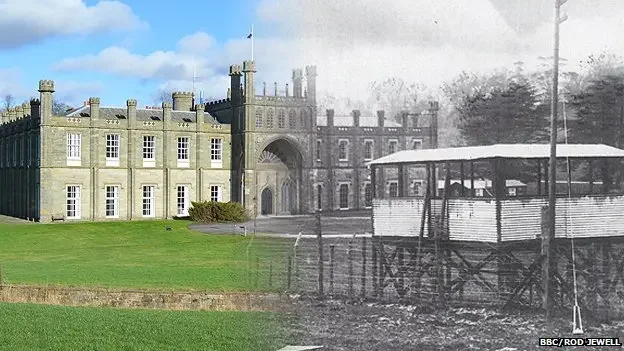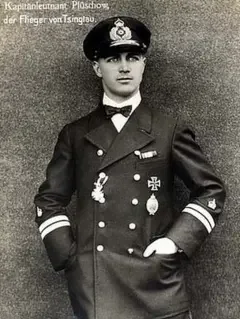Donington Park POW camp
It was a double scandal. A prison camp not only lavish enough that the inmates had servants, but also the scene of the only successful escape from the UK back to Germany.
During World War I, Donington Hall became a buywood for easy living and lack security. Sitting hundreds of acres of landscape deark, the mock Gothic stately home on the Leicester Derbyshire border had been turned into a detention camp early in the war. Intended as a maximum security prison, it was ringed by two barbed wire perimeter fences more than 6t high, the other one electrified with wire traps, watchtowers, search lights, and a guard house.
More fundamentally, however, it was a camp for officers, and total war or not, officers on both sides were guaranteed a certain level of treatment by international treaty. One of Donington's most striking features were its 90 capacity dining room based in the old library. It was all laid out with silver service cutlery and tablecloths, rather like a posh hotel. The local post office had to put on extra staff because so many parcels were sent from Germany. And of course, they were all waited on by German privates and corporals who were billeted in the huts in the grounds. On top of this were homely rooms, games of football, cricket, tennis, and skittles, and a relaxed regime where the commonant did everything he could to alleviate our hard lot.
According to one prisoner, new arrivals were welcomed with a guard of honor, and every Friday the prisoners were lined up to be given a cash allowance direct from Germany. Another inmate recalled holding his own wake following false reports that he had been shot.
The papers got wind of the conditions fueled by the tales of the brutality in German camps. The arrival and subsequent departure of dashing pilot Gunther Plushchow only added to its novelty during a rainstorm on the night of the 4th of July. Plushchow and an accomplice managed to hide from inspections and simply forced their way through fences. Despite being badly caught and having no identification, the pair made it to London undetected. While his comrade was recaptured, Plushchow days of sleeping rough found a ship going to neutral Netherlands. As it sailed, he swam out to it, climbed the rope, and hid in a lifeboat. When it docked, he dodged custom checks and stepped through the staff exit. and into the legend as the only person in either war to make it from the UK prisoner camp back to Germany.
When he came back from England, he was considered a hero in Germany. Plushchow star faded after the war, but his thirst for adventure did not. He died in a flying accident while exploring the Andes in 1931. Despite the controversy and conditions, the escape and another breakout using a tunnel, Donington continued as a prisoner of war cap until 1919.
After the first world war, the estate was brought by John Giles Shields, who hosted functions for paid visitors in both the hall and the grounds. Fred Craner persuaded the owner to host motor racing in the grounds with the first race being held in 1931.
The track was laid out using the paths and the roads of the Donington estate. The first major car event was the 200 mile tourist trophy races and these were followed in 1935 by the Donington Grand Prix.
Racing was brought to a halt by the onset of World War II in 1939. Park was requisitioned by the War Office and became number 29 vehicle reserve depot, the largest military facility of this type, housing up to 500,000 vehicles at onetime.



